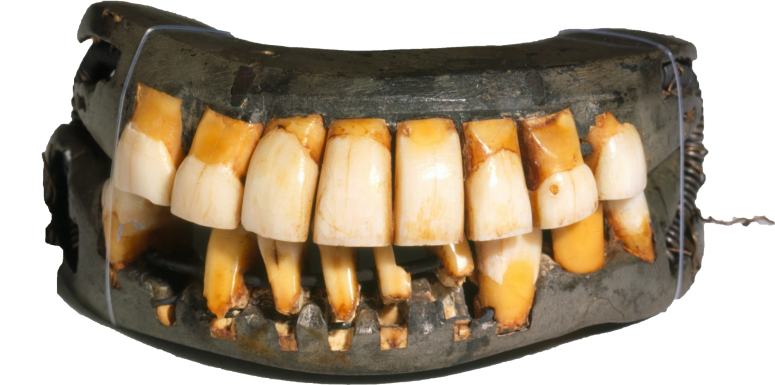“Observe good faith and justice towards all nations; cultivate peace and harmony with all.”
— George Washington

George Washington became the first President of the United States on April 30, 1789. He, of course, had a prominent and successful military and political career, but there are myths around the legendary man. For example, we all know the story of George Washington and the cherry tree, and how he had wooden teeth.[1] The myth about how George Washington’s teeth are thought to have started because for part of his life, he had only one pre-molar tooth poking up his gum. His poor dental health has been attributed to a combination of bad genetics and the limited dental knowledge of the 18th-century colonial era. This is thought to be one of the reasons why George Washington was never fond of speaking in public.[2]
The story of George Washington’s wooden teeth is one that has endured the test of time. In fact, most historians agree he lost his first tooth at age 24. According to John Adams, George said that it is mainly “attributed to his misfortune to cracking of Walnuts in his Youth”[3] which is a poor basis of conclusion why did he suffer the loss of teeth. On the other hand, Mount Vernon associate curator Laura Simo concluded that George’s family genetics contributed on almost half of his tooth problems while other half was the poorly educated dental hygiene at that time.
Of course, a toothless president and commander in chief for a new nation is not an ideal image. In fact, it has been speculated that George Washington had dentures made out of a variety of materials. John Smith, Jr., in his article for the Journal of the American Revolution, wrote that everything from “human teeth along with bone and ivory from hippopotamus, or “sea horse” as it was called in its day.” In addition, “Ivory from walrus and elephant may also have been used, along with lead, gold metal wire and springs, and brass screws” [4] – quite a myriad of materials!
Washington’s most notable Dentists in American History
Dr. John Baker was the first notable dentist in America. As indicated in George’s ledger, it is found that he serviced George Washington from 1772-1773, making house calls and home service appointments for the President. During this time, Dr. Baker made George a partial denture made of ivory. He wired these to Washington’s existing teeth – a good solution, but it is believed to have caused further damage to his existing teeth.
Dr. John Greenwood, He had a dental office in New York and studied under the dentistry program of Paul Revere, he was commissioned to take care of Washington’s dental needs. He is the most famous creator of Washington’s dentures. This is the only full set of denture that is located at Mount Vernon Estate and Gardens. It consists of upper denture and a lower partial denture. The lower partial denture has an opening to accommodate Washington’s only remaining natural tooth. The relationship with Greenwood continued until such time he retired from his presidential obligations. In 1796, this last remaining tooth was impossible to save, so Greenwood extracted it. In return, Washington gave the tooth to Dr. Greenwood as a gift. [5]
How did the “Wooden Teeth Myth” all start?
So to be clear, George Washington never had wooden teeth. Currently, Washington’s dentures are exhibited at Mount Vernon, in a circular glass case permitting a 360-degree view.[6] John Smith, Jr. speculated about the origin of the myth of Washington’s wooden teeth: “It’s hard to say...but historians and forensic dentists possibly know how it got started. Ivory and bone both have hairline fractures in them, which normally can’t be seen. With Washington’s fondness for Madeira wine, a very dark wine, over time the darkness of the wine started to darken the false teeth of the dentures. Then the thin fractures in the bone started to darken even more than the rest of the tooth, making the lines look like the grain in a piece of wood “that misled later observers.”[7]
Of course, dental technology has evolved significantly from the late 1700s. It is safe to say that George Washington’s dental history would most likely have looked very different had today’s advances been available. This did not stop the great man from having a very accomplished and distinguished career.
References:
- Richardson, Jay. “Cherry Tree Myth.” Retrieved from http://www.mountvernon.org/library/digitalhistory/digital- encyclopedia/article/cherry-tree-myth/ (Accessed May 29, 2018 )
- Etter, William M. “False Teeth.” Retrieved from http://www.mountvernon.org/library/digitalhistory/digital-encyclopedia/article/false-teeth/ (Accessed May 29, 2018 )
- Adams, John edited by L. H. Butterfield et al. ( 1961, December ) Diary and Autobiography of John Adams. Cambridge, MA: The Belknap Press of Harvard University Press.
- Smith, John L. Jr. ( 2014, November 5 ). “Drilling Holes in George’s Washington’s Wooden Teeth Myth.” Retrieved from https://allthingsliberty.com/2014/11/drilling-holes-in-george-washingtons-wooden-teeth-myth/ (Accessed May 29, 2018 )
- Smith, John L., Jr. ( 2014, November 5 ). “Journal of American Revolution.” Retrieved from https://allthingsliberty.com/2014/11/drilling-holes-in-george-washingtons-wooden-teeth-myth/ (Accessed May 29, 2018 )
- George Washington’s Mount Vernon. “The trouble with Teeth Retrieved from http://www.mountvernon.org/george-washington/the-man-the-myth/the-trouble-with-teeth/ (Accessed last May 29, 2018)
- Schultz, Colins. ( 2014, November 7 ). “George Washington didn’t have a Wooden Teeth - they were Ivory.” Retrieved from https://www.smithsonianmag.com/smart-news/george-washington-didnt-have-wooden-teeth-they-were-ivory-180953273/ (Accessed May 29, 2018 )
Written by Luisa Nacpil, RN
Reviewed by Lena DeBaz, DMD
FAQ:
Q: What causes dry mouth?
A: There are several causes of dry mouth. Dry mouth can be caused by many medications, especially medications for high blood pressure or for diabetes. Dry mouth is also linked with aging. If your dry mouth is medication-induced, do not stop taking your medication without consulting with your physician.
Q: Why is my dry mouth worse at night?
A: Nighttime dry mouth is very common, especially among people who breathe out of their mouths when they sleep. In addition, those who use devices for sleep apnea, like a CPAP machine, often experience more severe dry mouth.



